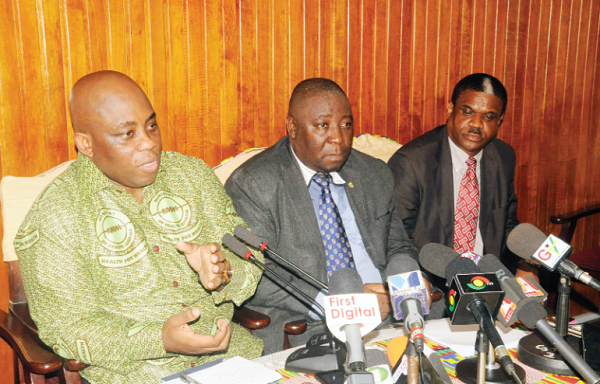
Rapid response team dispatched to Cape Coast to contain cholera outbreak
Following the outbreak of cholera in the Cape Coast metropolis, the Ministry of Health (MoH) has dispatched a cholera rapid response team to the area to contain the disease.
Advertisement
Since October 21, 2016, the municipality has recorded 157 cholera cases but no deaths.
Ghana, in 2014, recorded cumulatively 14,411 cholera cases, with 127 deaths, in 74 districts in eight out of the 10 regions.
MoH/GHS collaboration
At a press conference in Accra yesterday, the Deputy Minister of Health, Dr Victor Asare Bampoe, said to prevent a repeat of the cholera outbreak that occurred in the country in 2014, the ministry had taken adequate steps to contain the disease.
The ministry and the Ghana Health Service (GHS), he said, had provided the required logistics and funding for the Cape Coast metropolis for the management of the outbreak.
The deputy minister, who, together with a group of experts from Accra, had paid a working visit to Cape Coast earlier, said there had been no case fatality because people were reporting to the hospitals early, a situation which he said helped in treating the disease.
The Head of the Disease Surveillance Department of the GHS, Dr Badu Sarkodie, who addressed the media, said isolation centres had been provided at the Cape Coast Teaching Hospital and the Cape Coast Regional Hospital to manage the cases.
However, he said, people in the municipality were at greater risk of contracting the disease because they continued to drink unsafe and contaminated water, consume unhygienically prepared or contaminated food, as well as practise open defecation.
He, therefore, called for a collaboration with the metropolitan authorities to ensure that people desisted from practising open defecation and undertook good hygienic practices.
Interventions
Dr Sarkodie said measures such as intensive public education, enhanced surveillance, appropriate case management, including infection prevention control measures, water, sanitation and hygiene (WASH) interventions, as well as ensuring access to safe drinking water, were being encouraged.
He said all regions and districts in the country had been put on high alert, while there had also been the reactivation and enhancement of surveillance networks to capture early all new cases and manage contacts.
Health workers, he said, were also being re-trained in the appropriate management of cholera.
Additionally, oral rehydration points (ORPs) had been set up at key locations to prevent severe dehydration of patients at the community level before referral to cholera treatment centres (CTCs), he said.
There were also mobilisation activities, such as house-to-house visits and ORS demonstration, at the community level.
The World Health Organisation Country Representative, Dr Owen Laws Kaluwa, in a remark, said the organisation was working closely with the MoH to strengthen the country’s emergency response not only on cholera but other diseases.
He called for a sustained effort in the current fight against the cholera situation in the Central Region to ensure that it was contained.



